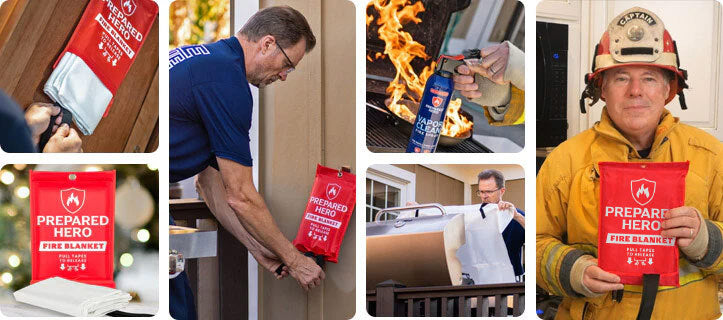Where you put your smoke detectors matters just as much as installing them. Proper placement makes sure they can detect...
Why did my fire alarm randomly go off in the middle of the night? It’s a question many of us ask when that annoying beep wakes us up. While smoke alarms are crucial to fire safety, they’re frustrating when they go off for no reason.
Understanding why this happens helps you fix the problem, avoid sleepless nights, and make sure your smoke alarm works when needed. Keep reading to learn why fire alarms randomly go off in the middle of the night and what to do when this happens.
Why Do Fire Alarms Randomly Go Off in the Middle of the Night?

- Fire
- Low Battery Life
- Humidity and Steam
- Cooking
- Dust or Debris
- Temperature Changes
- Insects
- Fireplace and Outdoor Smoke
-
Expired or Faulty Alarms
False alarms happen more often than you think. They’re usually caused by common issues that we often overlook. Whether it’s a fire, low battery, or humidity, understanding what causes these random beeps lets you sleep well and keep your home safe. Here are the reasons why your fire alarm randomly goes off in the middle of the night:
1. Fire
Even if you think the beeping’s random, it’s worth checking if there’s a fire. We don’t love false alarms, but in some cases, the alarm is warning you of a real danger. If your smoke alarm sounds not because of its battery or wiring, take a look around your house. Check for any signs of fire in your home. If you detect smoke or see flames, try to put it out with a fire blanket or fire spray (only if it’s safe). Otherwise, evacuate your house and call the fire department immediately. Your safety should always be the priority.
2. Low Battery Life
Another common reason fire alarms randomly go off is low battery. As the battery weakens, internal resistance inside the smoke detector increases. This change is more noticeable when the temperature drops at night. During this time, homes tend to cool down, causing the battery to struggle more to provide power for your alarm. Due to this, you might wake up in the middle of the night to a chirping smoke alarm that stops once the temperature rises a bit. Regularly checking and replacing the batteries can prevent this issue. If it doesn’t, find out why smoke detectors beep with new batteries here.
3. Humidity and Steam
Humidity and steam can also cause your fire alarm to randomly go off. The moisture in the air can mess with the sensor, especially if it’s humid or you frequently take hot showers. Though not dangerous, moisture particles are dense enough to be mistaken for smoke. In particular, ionization smoke alarms are more sensitive to them because they ionize particles.
Steam from cooking or boiling water can have the same effect. So, keep your ionization smoke detector away from places like bathrooms and kitchens. Making sure there’s enough ventilation by using fans or opening windows can also help prevent false alarms. Lastly, adding a dehumidifier in high-humidity areas can also make a huge difference.
4. Cooking
Cooking can also cause fire alarms to go off in the middle of the night. Smoke from burnt food or boiling water can set off an alarm. This happens more often when you’re cooking in the evening or late at night.
Since ionization smoke alarms are designed to be more sensitive to smoke than photoelectric ones, they will respond to small amounts of smoke. The key here is to use a photoelectric fire alarm in your kitchen. As an alternative, you can place a more sensitive alarm not too close to your kitchen but still within range to detect a real fire hazard. Opening the windows or using a kitchen fan can also help clear smoke and prevent false alarms.
5. Dust or Debris
Dust and debris can build up inside your fire alarm and mess with its sensor. These particles can come from many things, including pet hair, crumbs, or soot. Your detector might think they’re smoke and go off in the middle of the night.
Fortunately, there’s an easy way to fix this. Simply clean your smoke alarm using a vacuum cleaner or brush. Keeping your smoke detector clean and free from dust and debris keeps it functional and prevents false alarms. Remember, even a little dust and debris can trigger the alarm, so it’s a good habit to clean your smoke detector at least once every six months.
6. Temperature Changes
A sudden temperature change can also cause a smoke alarm to go off unexpectedly. For example, opening a window on a hot day might trigger it. The sudden influx of hot air creates a temperature difference, which could set your alarm off. Similarly, turning on the heat during winter can create a sudden shift in temperature that confuses the sensor. This happens more often in the middle of the night when temperatures drop.
Placing your smoke detector away from places with drastic temperature changes (e.g., near vents and heaters) helps reduce false alarms. You can also use a thermostat to regulate the temperature inside your home, especially if you’re in an area with significant temperature changes.
7. Insects
Insects are another surprising reason smoke alarms go off. Bugs, especially spiders, love to nest in small, dark places. So, smoke detectors are an ideal home for them. If they crawl inside the unit, their movement can trigger the alarm. Their presence can also mess with the sensor and cause it to malfunction.
Keep bugs out of your smoke alarm and put it in a place that’s not a bug magnet. If you think insects are the issue, carefully uninstall the smoke detector. Then, remove the cover to check. Get rid of the insects as gently as possible without damaging the sensors. You can also seal the cracks and gaps around your windows and doors to prevent insects from coming in.
8. Fireplace and Outdoor Smoke
If you have a fireplace or love grilling, the smoke from them might cause those annoying beeps. The smoke can easily wander indoors and set off the alarm, especially if it’s near an open window or door. This is more likely to happen when the air is still, and the smoke can’t escape.
You can prevent this by putting smoke detectors away from windows or doors that open to the outside. You should also regularly clean your fireplace to prevent smoke from reaching your fire alarms.
9. Expired or Faulty Alarms
Fire alarms don’t last forever. Most have a lifespan of about 10 years. Once they hit that age, their sensors begin to degrade, causing them to go off randomly. If it goes off without reason after replacing the batteries, cleaning the unit, and relocating the alarm, its age might be the problem.
Faulty wiring or a poor connection could also be to blame. In this case, replacing the system or calling a professional to inspect it is your best option. Regularly testing your smoke alarm is also a good practice.
What to Do When Smoke Alarms Go Off for No Reason

- Check if There’s a Fire
- Clean Your Smoke Alarm
- Replace the Batteries
- Inspect the Wiring
- Relocate the Smoke Alarm
- Reset the Alarm
- Test Your Alarm’s Sensitivity
- Press the Silent Button
- Replace the Smoke Detector
If you're tired of false alarms interrupting your relaxing night, there are simple steps you can take to fix the issue. Here’s what to do when your smoke alarms go off for no reason:
1. Check if There’s a Fire
Make sure there’s no fire before doing anything else. Sometimes, it’s easier to ignore the alarm when assuming it’s false. But if your smoke alarm is sounding off and you can’t find any obvious reason, check for signs of fire. If you detect smoke or see flames, try putting the fire out only if it’s safe. Otherwise, evacuate immediately and call the authorities. Don't take any chances; remember that it’s always better to be safe than sorry.
2. Clean Your Smoke Alarm
Dust and dirt can get into your smoke detector and mess with its sensors. Over time, particles like pet hair, dust, or soot can block the sensor and trigger it for no reason. Fix this by cleaning your alarm at least once every six months. If you live in an area with lots of dust or debris, clean it at least once every three months. You can vacuum it with a soft brush attachment or use compressed air to blow out dust and debris. Keeping it clean doesn’t just prevent false alarms. It also ensures your alarm will work when you need it the most.
3. Replace the Batteries
Smoke alarms sound when their batteries are running low. When this happens, your detector will beep or chirp until it gets power again. According to the National Fire Protection Association (NFPA), battery-powered alarms need new batteries at least once a year. So, set a reminder and use the right battery as specified by the manufacturer. If the batteries are the problem, changing them will stop the beeping.
4. Inspect the Wiring
The wiring could also be the problem. It’s more common in hard-wired smoke detectors than battery-powered ones. Over time, the wires become loose or damaged, causing the fire alarm to malfunction. Solve this by checking the connections and checking if all wires are secure. If you find any issues, call a professional to inspect and fix them. However, faulty wiring is not the only reason why detectors chirp out of nowhere. Find out why hard-wired smoke detectors beep here.
5. Relocate the Smoke Alarm
Sometimes, the placement of your smoke alarm is to blame. It could go off unnecessarily if it's near areas that produce a lot of steam or smoke. These include the kitchen, bathroom, and fireplace. Relocating the alarm a bit far from these areas can help reduce false triggers. It’s a simple fix that might save you from waking up to that annoying sound in the middle of the night.
6. Reset the Alarm
If you’ve changed the battery but the alarm keeps beeping, it may not have reset properly. After replacing the battery, press and hold the test button for about 15 seconds to reset the alarm. This step drains any residual charge left in the system and ensures the alarm is properly reset. If the beeping continues, try cleaning the smoke detector or checking if it needs a replacement.
7. Test Your Alarm’s Sensitivity
Smoke alarms are designed to pick up even small amounts of smoke, but sometimes they’re just too sensitive. Many alarms come with a button to test the unit. Just press it and see if the alarm sounds off. Some alarms also let you adjust the sensitivity. If your alarm has this feature, lower the sensitivity to prevent false alarms triggered by minor smoke or steam.
8. Press the Silent Button
If your smoke alarm goes off and you’re sure there’s no danger, try using the silent button. Most modern alarms come with these buttons to prevent annoying sounds while people cook. Press and hold the hush button for 10 to 20 seconds to stop the beeping. Doing this helps if the alarm gets triggered by cooking.
9. Replace the Fire Alarm
Smoke alarms last up to 10 years. If your detector is near or over a decade old, replace it as soon as possible. Even if they seem to work fine, replacing them with a new one is a must. Doing this ensures that they remain reliable and prevent false alarms in the middle of the night.
Do Smoke Alarms Go Off for Carbon Monoxide?

No, regular smoke alarms don’t go off for carbon monoxide. They’re designed to sense smoke, not gases. Carbon monoxide is a colorless, odorless gas that calls for specialized sensors. However, some smoke alarms can detect both smoke and carbon monoxide. They can alert you if smoke and dangerous levels of carbon monoxide are present. If you're worried about both, you can use these combination units. Carbon monoxide poisoning can be deadly but often goes unnoticed because you can’t see, taste, or smell it.
What Does It Mean When a Smoke Detector Blinks Red?

A smoke detector that’s blinking red means the alarm is working but not triggered. Many modern alarms have this feature. However, if the red light blinks in a pattern or continues blinking after testing the alarm, there might be another issue. One of the most common reasons is that the battery is low, which is usually accompanied by a beep or chirp. If your detector is battery-operated, replacing the battery should solve the problem.
The red light might sometimes mean dust or dirt has clogged the sensors. Cleaning the device should clear this up. If there’s smoke in the air, the red light could be flashing as an added visual cue that warns you of fire. Lastly, the red light might be blinking to tell you that the alarm is at its end of life.
How Do You Tell if It’s a Fire Alarm or Carbon Monoxide?

You can tell if it’s a fire alarm or carbon monoxide detector by listening to the sound it produces. Fire alarms and carbon monoxide detectors emit different sounds. Fire alarms usually emit a loud, continuous siren-like sound, while carbon monoxide detectors usually make a series of beeps—often four in a row, followed by a pause. If you have a combination unit, a continuous alarm likely means there’s a fire. Meanwhile, short beeps likely mean that the carbon monoxide levels are getting dangerous. Either way, you should act quickly and evacuate your home if needed.
What if a Carbon Monoxide Detector Goes Off and Then Stops?

If your carbon monoxide detector goes off and then stops, take the warning seriously. Don’t assume everything is fine just because the detector turned off. Carbon monoxide can be harmful even at lower levels, so open the windows and doors immediately to ventilate the space and clear out any remaining carbon monoxide. Then, check the detector to see if it sounds or gives visual cues. If the alarm goes off again, evacuate your house and call for help immediately.
Can One Bad Smoke Detector Set Off Another?
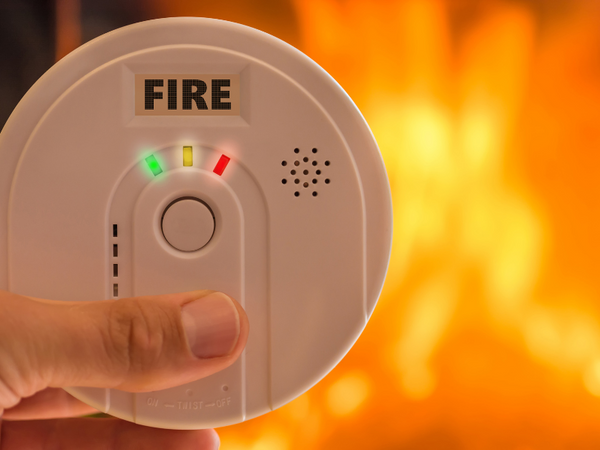
Yes, one bad smoke detector can set off another alarm if they are interconnected. One malfunctioning alarm can set off others even if there’s no fire. If your interconnected smoke detectors set off without a fire, you have to determine which one is triggering the system and fix it. On the other hand, one bad standalone smoke detector can’t set off another.
Conclusion
Fire alarms can go off in the middle of the night for several reasons. While it can be frustrating to deal with false alarms, understanding the causes helps you fix the problems right away.
Remember, a fire alarm keeps your home safe by providing early warnings in case of a fire. But it works best when combined with other safety tools, like fire sprays and fire blankets. These tools help contain small fires before they spread, making your home safer. Having both preventive and responsive measures in place makes you ready for anything.
Do you want reliable, easy-to-use, and affordable tools to put out small fires before they spread? Check out Prepared Hero’s fire prevention tools here, and get up to 51% off on certain items. Stay safe, hero!


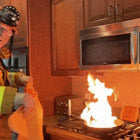 Fire
Fire Safety
Safety Survival
Survival Protection
Protection New
New Scouting America
Scouting America
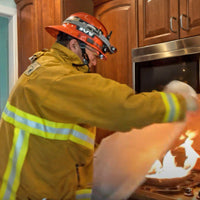 Fire
Fire Safety
Safety Survival
Survival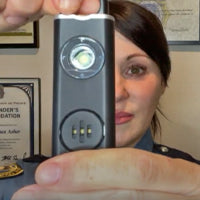 Protection
Protection New
New






